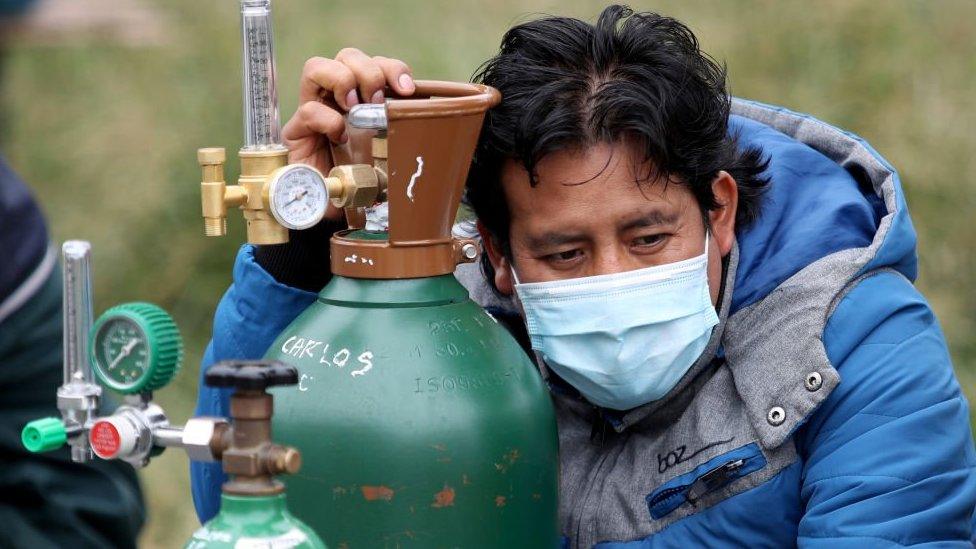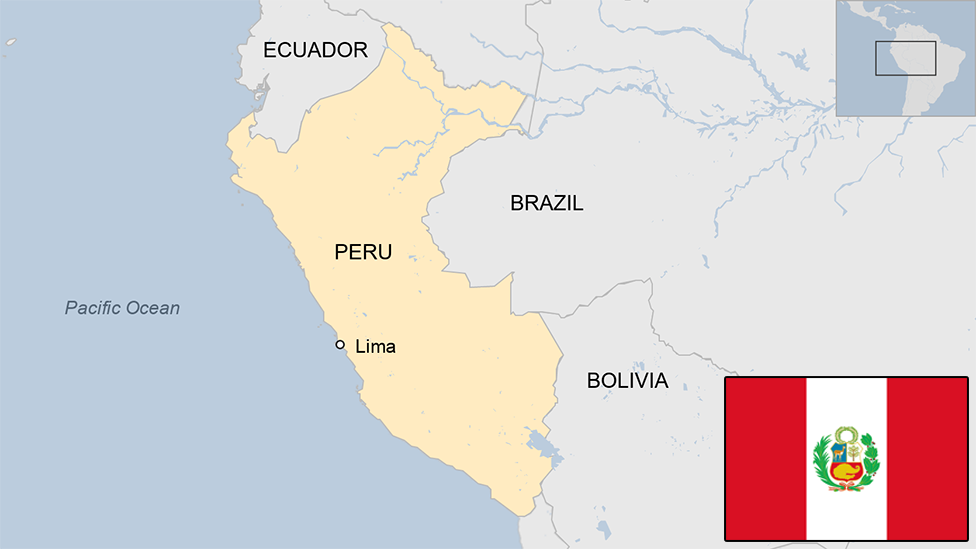Peru election: Country on edge ahead of unpredictable run-off
- Published

The run-off vote between Pedro Castillo and Keiko Fujimori is the most divisive election in Peru's recent history
Peru's presidential run-off on Sunday will be the Andean country's most polarised election in its recent history.
The vote pits a left-wing teacher and populist political newcomer, Pedro Castillo, against a household name, right-winger Keiko Fujimori, the daughter of jailed ex-President Alberto Fujimori.
Uncertainty has gripped this country ahead of what polls have predicted will be a very close race.
Mr Castillo was the unexpected winner of the first round in April, which saw votes split among a wide field of candidates.
The teacher, who likes to campaign in a cowboy hat and often carries an oversized pencil - the symbol of his Free Peru party - won nearly 19% of the votes, followed by Ms Fujimori with 13.4%.

Pedro Castillo has drawn intense media security since winning the first round
Since then, Mr Castillo has appeared to maintain an advantage, but the gap between the two has narrowed dramatically, with the most recent opinion polls suggesting a technical draw.
Deadly attack overshadowed campaign
In the countdown to the run-off, tensions in the electoral battle were exacerbated by violence on the ground.
On 23 May, an attack in central Peru killed 16 people, including four children. The armed forces blamed remnants of the Maoist Shining Path guerrilla group that has a bloody history in the country. Both Mr Castillo and Ms Fujimori condemned the attack.

Peru has been badly hit by the Covid pandemic
Peru has also been hit hard by Covid-19. Earlier this week, it became the nation with the world's worst death rate from the virus per capita, after the government changed the methodology it uses to register Covid deaths.
As a result, the official toll almost trebled to more than 180,000.
A polarised nation
"We're in a country where people are polarised," the outgoing president, Francisco Sagasti, said earlier this month of the deep political divisions in Peru.
"Respect for democracy, for its institutions, is absolutely essential," Mr Sagasti, who is not eligible for re-election under Peru's constitution, said. "These are going to be very difficult elections," he added.
Both Mr Castillo and Ms Fujimori recently sought to reassure voters by signing an "oath for democracy" in which they pledged to protect the independence of the powers of the state.

Peru at a glance
The country has a population of about 32 million
Inequality remains high, especially between those who live in urban and rural areas
The pandemic has hit it hard, and nearly a third of its people are now in poverty
It has been through a series of political crises in recent years and, last November, it was led by three presidents within the space of a week
Sources: World Bank, CIA Factbook

Castillo appeals to rural voters
As a relatively new face on the political stage, the 51-year-old has attracted intense media scrutiny since his victory in the first round. Polls suggest he has strong support in rural areas outside the capital, Lima.
Critics of the left-wing candidate fear he could radically reform the country and have waged negative social media campaigns against him, describing him as a "communist" and labelling him as a sympathiser of the Shining Path. Mr Castillo has repeatedly denied any ties to the group or to its political sympathisers.

Shamans perform rituals to predict the winner - though recent polls suggest the race could end in a technical draw
The former union leader, who led a national teachers' strike in 2017, has put education at the heart of his election campaign. He has promised to increase the country's educational budget from 3.5% to 10% of the gross domestic product.
While he has vowed to respect private property, he also proposes to renegotiate tax contracts with large mining companies, which play a key role in the economy. He has also said he wants to rewrite the country's constitution "to end all inequalities", and that "human rights have to be a priority".
Fujimori benefits from name recognition
The 46-year-old candidate of the right-wing Popular Force party is a household name in Peru. She is a former congresswoman and was the runner-up in the 2011 and 2016 presidential election run-offs.

It is the third time that Keiko Fujimori is in a presidential election run-off
Her father is serving a 25-year sentence for graft and human rights abuses and remains a divisive figure in Peruvian politics. She has said she will pardon him if elected.
Keiko Fujimori says that, if she becomes president, her government would be a "demodura" - a play on the Spanish words for "democracia" (democracy) and "mano dura" (hard hand) - promising a tough line against crime and corruption.
Seeking to woo the votes of Peru's poor and underprivileged, she also said her government would give 10,000 soles ($2,600; $1,830) to families who had lost a relative because of Covid-19. She also proposed that 40% of mining royalties be directly distributed "to the population" in regions where local governments receive these resources.
But critics of Ms Fujimori say she has included in her team people associated with her party's "old guard", who remain loyal to her jailed father.
Related topics
- Published1 June 2021

- Published4 September 2023
